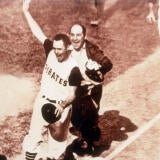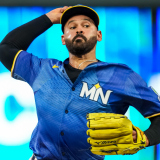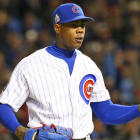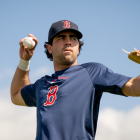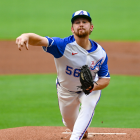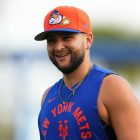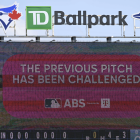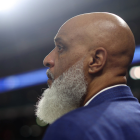MLB Winter Meetings Preview: A team by team guide for the National League
A look at what each team in the National League has to address at the upcoming Winter Meetings

Major League Baseball's owners and players union dodged a completely insane and pointless work stoppage Wednesday night, saving the sport from driving itself into a ditch, and leaving the greedy legacy of Bud Selig, Jerry Reinsdorf and the screwjob of 1994 intact.
With the fate of the baseball world no longer hanging in the balance, let's turn our direction to next week's winter meetings. For four days, execs from all 30 teams will gather in deadbolted suites, eschewing daylight in favor of wild-and-woolly deal negotiations that will, more often than not, fail miserably.
Still, Hot Stove season is never dull. Every team has holes to fill and money to spend this winter. We might even see a handful of star players change addresses via blockbuster deals. Here's a sneak peek at some of the moves that each team could make in the near future, possibly as soon as next week's meetings in Washington, D.C.
We'll begin with a look at the National League and will preview the American League on Monday.
NL WINTER MEETINGS GUIDE:
 Arizona Diamondbacks
Arizona Diamondbacks
D-Backs starting pitchers were pretty, prettaaaaayyyyy bad last season. They finished dead last in the National League (and second-to-last in the majors) with a 5.19 ERA. They ranked 20th in MLB with a paltry 884 â innings pitched, and 26th in the majors in walk rate. Even adjusting for hitter-friendly Chase Field doesn't help matters much: Arizona starters ranked 28th in park-adjusted ERA and 21st in park-adjusted fielding-independent pitching in 2016.
And yet, they might be shopping one or more of their starters as we speak. The team's recent trade for right-hander Taijuan Walker gives Arizona five mid-20s starters who offer both upside and multiple years of control: Walker, Patrick Corbin, Shelby Miller, Archie Bradley, and the baffling Robbie Ray. With staff ace Zack Greinke also on board and top prospects like Braden Shipley on the verge of cracking the big leagues, that's a surplus that could be converted into help elsewhere, with corner outfield still in need of an upgrade. Another thought: Since the best relief pitchers are often former failed or mediocre starters, why not shuttle one or two of those young arms into high-leverage relief work? After all, the Diamondbacks bullpen was pretty awful last season too, and you never where the next Andrew Miller might come from.
 Atlanta Braves
Atlanta Braves
R.A. Dickey? Bartolo Colon? Jaime Garcia? And maybe Jose Bautista or even Chris Sale?! Why would a last-place team coming off a 93-loss season and seemingly multiple years away from contending focus so heavily on win-now players?
There's a good explanation for all of the above. In Colon and Dickey, the Braves committed nothing more than one-year contracts, nabbing a pair of right-handers who at worst seem likely to soak up a whole bunch of innings, a welcome skill for a rebuilding ballclub that won't want to rush or burn out any of its young arms. Despite being much younger than Colon and Dickey, Garcia is far less of a sure thing to soak up lots of innings, but he also enough upside to become the team's default number-one starter. Bautista's asking price dropped sharply after an injury-plagued season that saw both his hitting and fielding decline, and he'd make sense for any team on a buy-low two-year deal. As for Sale, true aces are incredibly tough to find, and teams can't always perfectly choreograph the timing with which they acquire elite talent; if Sale is gettable, go get him, and sort out the little details later. (Note: I don't actually think the Braves will land Sale.)
 Chicago Cubs
Chicago Cubs
Count me as unconvinced that Jon Jay will be anything close to a viable replacement for Dexter Fowler in center field. Jay is a career .269/.333/.360 hitter who plays subpar defense. So the Cubs' best hope is that a timeshare brings out the most in every outfielder on the roster: Sit Kyle Schwarber against tough left-handed pitchers; sit Jason Heyward if his bat doesn't come around; sit Jorge Soler against the toughest junkballers; slide in Albert Almora Jr. and hope that he starts to fulfill his potential; keep slotting Ben Zobrist and Kris Bryant in the outfield when the time is right; then give Jay a few at-bats as an outfield version of Tommy La Stella.
With Aroldis Chapman and Jason Hammel both testing free agency, count on the Cubs to make a move for an arm or two. The ridiculous insistence by White Sox brass that they won't trade Chris Sale to their North Side counterparts eliminates that option, but the Cubs still have enough top-of-the-rotation-caliber talent to make a deal for a capable innings eater make lots of sense. The Cubs could either leverage their ample stockpile of young talent to swing a deal, or throw a mid-level offer at someone like Rich Hill or Ivan Nova in a thin starting pitching market.
 Cincinnati Reds
Cincinnati Reds
They've thus far swatted away any thought of dealing hitting savant Joey Votto, with their franchise player locked up through 2023 (2024 if they pick up his option the year he turns 41). With no other blue-chippers to offer, that means it's likely going to be a slow, incremental rebuild for the Reds.
If anything, this winter could prompt some serious self-examination by the Reds when it comes to several other key incumbents. Zack Cozart bashed a career-high 16 homers while playing his usual stellar defense last season; he's also 31 years old and can test free agency a year from now. Adam Duvall broke out with a 33-homer, 103-RBI onslaught last season; he also posted a ghastly .297 on-base percentage, is already 28 years old, and with five years of controllable service time might make a perfect sell-high trade chip right now. Billy Hamilton's an excellent defender in center field and probably the fastest baseball player in the league; we also now have years of evidence that he's a pretty lousy hitter. When these are the second-through-fourth best position players on your roster, you've got some tough decisions to make.
 Colorado Rockies
Colorado Rockies
A legitimate limbo team. The Rockies have assembled their best collection of young pitching talent in franchise history. They're backed by an impressive collection of hitting talent, led by the young infield combination of Nolan Arenado, Trevor Story, and DJ LeMahieu, and an outfield that features three-time All-Star Carlos Gonzalez, do-it-all center fielder Charlie Blackmon, and sweet-swinging 22-year-old David Dahl. If Colorado stands pat with its core talent and spends real money to upgrade at first base, catcher, and especially in the bullpen, that young rotation (all five projected starters are 27 or younger) could offer enough upside to trigger a surprise contending season in Denver.
The Rockies haven't shown much interest in spending significant dollars on free-agent talent since the notorious Mike Hampton/Denny Neagle double-bust of 2000, which came five years before the Monfort brothers took over as primary owners, bringing with them a conservative approach to roster-building. The Rockies draw well every year for a perennially lousy team, and the locals often wonder why the Monforts don't sign bigger offseason checks, given how jammed Coors Field and its incredible roof deck often is on beautiful Colorado summer nights. Until we see proof that ownership is willing to go the extra mile for a playoff push, bet the under on the Rockies doing anything all that interesting.
 Los Angeles Dodgers
Los Angeles Dodgers
A Major League Baseball mandate to cut debt will likely prompt the Dodgers to cut payroll for a second straight season. Per ace Los Angeles Times national baseball writer Bill Shaikin, the goal is to lower salary spending from about $300 million in 2015 to around $200 million in 2018. With major penalties now on the books for 2017 payrolls over $235 million, the urgency to hold the line only rises. As Shaikin wrote, the Dodgers haven't spent more than $48 million on a major-league free agent since Andrew Friedman took over as president of baseball operations two years ago. If they hold to that formula, top free agents Kenley Jansen and Justin Turner will surely sign elsewhere.
Still, if you're a Dodgers fan, take heart. Friedman, GM Farhan Zaidi, and company absorbed heaps of scorn last winter, when the team opted not to sign megastar free agents like Zack Greinke and David Price, instead targeting lower-priced talent like Kenta Maeda. It was all part of a broader process that Zaidi called the Dodgers' effort to win with "youth, data, and depth." And it worked, with L.A. winning its fourth straight NL West title and coming within two games of making the World Series, despite suffering through a blizzard of pitching injuries. Luis Valbuena leading a third-base platoon? Brad Ziegler as a much cheaper (but still effective) late-inning alternative to Jansen and Aroldis Chapman? A Doug Fister flyer? Twenty-five bargain homers from Brandon Moss as part of a left-field platoon? With a deep and talented roster led by superduperstars Clayton Kershaw and Corey Seager, that kind of bargain-hunting could be enough to peg the Dodgers as favorites to win the West for the fifth straight time.
 Miami Marlins
Miami Marlins
How does a franchise recover from an event as devastating as Jose Fernandez's death? We root for a reaction as resilient as Dee Gordon's -- a blast into the bleachers leading off for the Marlins in the first game back after the untimely death of Miami's ace, with Gordon riding a wave of adrenaline and emotion and tears all the way around the bases, and into the arms of his Marlins teammates.
As awful and crass as it is to attempt baseball analysis after this kind of tragedy, the reality for the Fish is ... not great. Marcell Ozuna, Christian Yelich, and Giancarlo Stanton should again vie for the title of best baseball outfield in the league, especially if Stanton can finally stay healthy for a full season. But the rotation is going to be really bad, with no Marlins starter other than Fernandez posting even league-average results last season, and Edinson Volquez coming off a 5.37 ERA season unlikely to fix anything. There's buzz that Miami might pursue a top relief pitcher, which could lengthen the pen and take some pressure off that shaky starting five. That still probably won't be enough to challenge the Nats and Mets at the top of the division.
 Milwaukee Brewers
Milwaukee Brewers
When it comes to optics, it's clear that Brewers GM David Stearns gives zero F's: Non-tendering defending National League home-run champ Chris Carter, then immediately throwing a three-year deal at a player who'd left the big leagues to play in Korea (Eric Thames), confirmed that. Stearns deserves some benefit of the doubt, though. Fleecing Jonathan Villar from his former team in Houston, nabbing toolsy outfielder Keon Broxton for even less, and building the speediest team MLB has seen in seven years for the equivalent of pennies was quite the coup.
So what's next? The Crew is still a year or three away from being ready to spend on premium talent. That makes shiny pickups unlikely, and a Ryan Braun blockbuster a real possibility. Braun still has four years and $86 million left on his contract (plus a club option for an additional $11 million), which could shove lower-revenue teams out of the picture. Even at that dollar figure and at age 33, Braun remains one of the most potent hitters in the game, coming off a .305/.365/.538 campaign that also marked the first time in four years he'd reached the 30-homer mark. Given how aggressive Stearns has been on the trade market (he traded away Francisco Rodriguez, Adam Lind, Jean Segura, and Khris Davis last offseason), there's a chance Braun could be wearing another uniform by the time everyone jets out of D.C. on Thursday.
 New York Mets
New York Mets
Yo's back! Star outfielder Yoenis Cespedes' second straight offseason contract opt-out prompted the Mets to lock him up into his mid-30s, on a four-year, $110 million deal. That makes a subsequent trade very likely, given the outfield logjam that also includes veterans Curtis Granderson, Jay Bruce, and Juan Lagares, and 23-year-old Michael Conforto, who burst onto the scene with an impressive 2015 debut before struggling mightily in 2016.
The Mets would prefer to move Bruce for obvious reasons, ranging from the slugger becoming a free agent after next season to Bruce's atrocious defense. Still, Granderson has predictably attracted more interest, which could leave the Mets with a tough dilemma: Give away Bruce for next to nothing and keep the outfield corps intact, or flip Granderson for young talent they could use to restock the farm system (plus maybe a bullpen piece to add depth after Jeurys Familia and Addison Reed). Flipping Granderson would create a gaping hole in center, where Lagares could handle the position when a left-hander takes the mound for the other team, but no one remotely competent would be available to play there for those 120 other games.
 Philadelphia Phillies
Philadelphia Phillies
Here come the kids. The 2017 season should see a slew of intriguing prospects -- catchers Jorge Alfaro and Andrew Knapp, right-handers Jake Thompson, Zach Eflin and Alec Asher, outfielders Nick Williams and Roman Quinn, and potential star shortstop J.P. Crawford -- get their first run of extended playing time in the big leagues.
Don't expect the Phillies to do anything that might block the path for any of those up-and-comers. Meanwhile, every projected starting position player but newly acquired Howie Kendrick is 28 or younger. No need to rush the process here.
 Pittsburgh Pirates
Pittsburgh Pirates
The big news here is Andrew McCutchen. Multiple reports have the Buccos aggressively shopping the former MVP, who has two years and $28.5 million left on his contract (counting the $14.5 million option that will surely get picked up in 2018).
There's plenty of logic here. No team should be in the business of paying for a player's decline years, least of all a lower-revenue club like Pittsburgh. McCutchen is coming off a down year in which both his offensive and defensive numbers took a nosedive (though in the case of the latter, that's probably largely due to the Pirates playing Cutch far too shallow in center). The closest comp to McCutchen taking such a huge step back at age 29 might be Troy Tulowitzki doing so in his age-30 season, which ended with a trade to Toronto and Tulowitzki still not recovering his elite hitting stroke. Also, the Pirates would be better served with the rangier Starling Marte shifting to center (McCutchen has said he doesn't want to move to a corner). With top outfield prospect Austin Meadows poised to make it to The Show by this summer, a surplus could be imminent as well.
None of this means the Pirates should feel obligated to trade McCutchen. But in a market that's flush with one-dimensional hitters but lacking in star quality, it's not hard to imagine one or more teams making a real pitch for Cutch.
 San Diego Padres
San Diego Padres
Two years ago, then-newly-hired GM A.J. Preller pushed all in, cashing in multiple prospects and tons of money in an effort to do ... well, something. Matt Kemp, Justin Upton, Will Middlebrooks, and James Shields are now long gone, and the Padres are picking up where they left off before Preller, trying to rebuild an organization that's been through too many owners, presidents, and GMs to count, while losing more often than almost anyone else.
With a lineup comprised entirely of under-30 talent, the Padres could opt to stick with status quo there. The pitching staff will eventually need a major overhaul, though. Tyson Ross just underwent thoracic outlet syndrome surgery and might not be ready for Opening Day, leaving aside that he's a free agent at the end of next season. The other four projected starters, Christian Friedrich, Jarred Cosart, Paul Clemens, and Luis Perdomo, combined to post an ERA just under 5.00, and none are considered the kind of premium young pitchers you'd expect to break out down the road. Going for a big splash failed Preller the first time. This time, smart drafting, on-point player development, and a lot of patience will be needed.
 San Francisco Giants
San Francisco Giants
They've shored up the rotation, thanks to last winter's acquisitions of Johnny Cueto and Jeff Samardzija, and the midseason trade of Matt Duffy for left-hander Matt Moore.
Next up, the corners, where left fielder Angel Pagan's free agency and third baseman Eduardo Nunez being an unreliable player who's also a year away from free agency should prompt the Giants to shore up both positions. Poaching Justin Turner from the arch-rival Dodgers could be a great fit (though some projections have him landing $20 million a year or more), while Dexter Fowler, Ian Desmond, or Carlos Gomez offer the kind of all-around game that a player needs to patrol the spacious outfield at AT&T Park. Given their lack of impact prospects they could move in trade, the Giants look destined to attack the top of a suspect free-agent class instead. That includes on the closer market, where Kenley Jansen, Aroldis Chapman, and Mark Melancon can all be had. Following the worst season posted by a Giants bullpen in years, the old adage of not spending big money on closers need not apply.
 St. Louis Cardinals
St. Louis Cardinals
The biggest need is in center field, with the Cards eager to shift Randal Grichuk to a corner spot full-time. Dexter Fowler, Ian Desmond, and Carlos Gomez project as the most obvious candidates, though John Mozeliak hasn't been shy about making impactful trades when needed. The Cards already have a bit of an infield surplus, with Matt Carpenter moving to first, and Kolten Wong, Aledmys Diaz, Jedd Gyorko, Jhonny Peralta, and Matt Adams all capable of playing everyday (or close to it). There have been rumors that St. Louis might pursue free-agent third baseman Justin Turner too, which would only increase the infielder surplus, and the chance of a trade.
However it happens, getting an impact center fielder could propel the Cards right back into the postseason. The rotation should be at full strength with Lance Lynn expected back by spring training, though rumors persist that St. Louis could add another starter, especially after shipping Jaime Garcia to the Braves Thursday. Add a capable bullpen that's been bolstered by the signing of Brett Cecil, and this could be one of the deepest (and best) teams in the league in 2017.
 Washington Nationals
Washington Nationals
I didn't fully appreciate Nationals GM Mike Rizzo's track record of impactful trades until I read Buster Olney's recent piece on him. Gio Gonzalez, Trea Turner, Joe Ross, Denard Span, Wilson Ramos, Yunel Escobar, Doug Fister, and others all came to D.C. via favorable deals made by Rizzo. Olney speculates that the Nats, armed with lots of young pitching talent, could be a contender for Chris Sale's services this winter.
As great as Sale is, Washington's rotation could be loaded next year without him, with Stephen Strasburg and Ross healthy and electric right-handers Lucas Giolito and Reynaldo Lopez knocking on the door. Improving the roster up the middle is a greater need: Catcher could be a need with Ramos a free agent (though the Nats could roll with rookie Pedro Severino), and acquiring either a shortstop to improve on Danny Espinosa, or a center fielder (Andrew McCutchen?) who could bump Trea Turner back to his natural position at short would help a lot. Look for Rizzo to nab some late-inning bullpen help with Mark Melancon also testing free agency. Whether or not Sale makes it to the nation's capital, expect the Nats to be one of the busiest shoppers in the league this offseason. Again.


